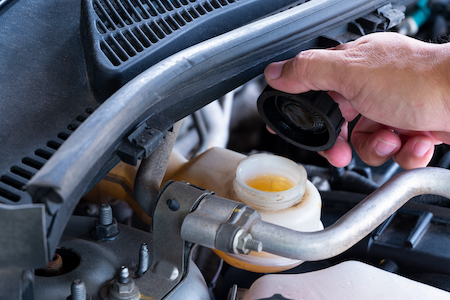Drip. Drip. Drip.
It’s something you might not notice right away. But eventually, you’ll discover your vehicle is leaking. What is it? What does it mean?
Cars use a variety of fluids to keep them operational:
- Motor oil
- Coolant
- Brake fluid
- Transmission fluid
- Power steering fluid
- Windshield washer fluid
- Gasoline
Try and operate your vehicle without one of these essential fluids. It won’t happen. It’s up to you to ensure all systems work well, and the fluids are at proper levels.
Including brake fluid. Brake fluid leaks can not only impact your brake system’s functionality but can also put you at risk. Imagine driving down the mountain after a day of skiing, and your brakes no longer work.
With so much riding on your brake system, here are a few things to consider if you find a brake fluid leak.
How brake fluid keeps the brake system operational
Brake fluid is a crucial component of a vehicle’s brake system. It is responsible for transmitting power from the brake pedal to the brake calipers to the brake pads, slowing the wheels down.
The brake system is closed, meaning that brake fluid is sealed inside and doesn’t typically need to be refilled the way you do motor oil or coolant. However, over time, the fluid can become contaminated or lose effectiveness, leading to decreased braking performance or even failure.
Brake fluid is typically made of a glycol-based fluid designed to withstand high temperatures and maintain viscosity over time. When the brake pedal is pressed, the brake fluid is forced through small passages in the brake lines and calipers. The brakes may not function properly if the fluid doesn’t flow easily.
The brake fluid also acts as a lubricant for the various moving parts in the brake system, such as the brake calipers and the brake pads. This helps to prevent wear and tear on these parts and keeps the system running smoothly. The brake fluid is also responsible for protecting the brake system from corrosion by forming a protective barrier on the metal components.
Brake fluid is hygroscopic, which means it absorbs moisture over time. This can decrease the fluid’s boiling point, which can cause brake fade or failure. Therefore, it is important to have the brake fluid checked regularly, and to replace it if necessary.
Check your owner’s manual for guidance, but brake fluid should generally be replaced every two to three years. Some manufacturers recommend replacing the brake fluid more often, such as every 30,000 miles or so. Replacing the brake fluid can help to ensure that the brakes are in good working condition and can help to prevent costly repairs down the road.
What can cause brake fluid to go bad?
Brake fluid is an essential component of a vehicle’s brake system, responsible for transmitting force from the brake pedal to the brake calipers, eventually slowing the wheels down and bringing the car to a stop. However, brake fluid can become contaminated over time or lose effectiveness, leading to decreased braking performance or even failure. Understanding the causes of brake fluid deterioration is essential to ensure that the brake system is functioning correctly and prevent costly repairs.
One of the most common causes of brake fluid deterioration is exposure to moisture. Brake fluid is hygroscopic, which means it absorbs moisture over time. This can decrease the fluid’s boiling point, which can cause brake fade or failure. Moisture can enter the brake system through the brake lines, calipers, and other components. This can happen due to leaks in the design, condensation due to temperature changes, or even through the brake fluid reservoir itself.
Brake fluid deterioration can also happen when exposed to high temperatures. As brake fluid is forced through the brake lines and into the brake calipers, it is subjected to high temperatures. This extreme heat can cause the fluid to break down, leading to decreased effectiveness and a reduced ability to lubricate the moving parts in the brake system. High temperatures can also cause the fluid to boil, resulting in brake fade or failure.
Contamination can also occur. This comes from rust, dirt, or other particles entering the brake system. These contaminants can cause the brake fluid to become dirty or discolored, reducing its effectiveness and leading to decreased braking performance. Contamination can also cause the brake system to wear out more quickly, leading to costly repairs.
Like other car parts, age will eventually become a factor. Over time, brake fluid will lose its effectiveness and can become contaminated. This can happen as a result of the fluid absorbing moisture, becoming polluted with dirt or other particles, or simply due to the age of the liquid. Replace the brake fluid periodically, even if it appears to be in good condition.
Brake fluid can also fail due to a lack of maintenance. The brake fluid can be compromised if the brake system is not maintained correctly. This can happen due to not checking and replacing the liquid regularly, not properly cleaning and inspecting the individual components in the brake system, or not correctly lubricating the moving parts. One part feeds to another; a regular maintenance schedule will ensure everything is working well.
Have a brake fluid leak?
Brake fluid is typically a light yellow color, but it will darken to gold or brown with age. If you see it underneath your car, or notice it accumulating in your wheel wells, it’s a sign of a leak.
It could be coming from any component within the brake system. It could be a failure of any part at any time.
But there’s one surefire way to prevent failure and deterioration before it starts; have brake fluid checked regularly, and replace it if necessary.
Start by checking your owner’s manual for guidelines. Then schedule a maintenance visit with one of our mechanics to be sure that the leak isn’t a sign of a bigger problem.
How can we help you today?

